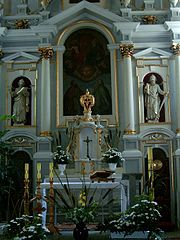
A History Of The Mass And Its Ceremonies In The Eastern And Western Church -Rev John O'Brien A.M.
PREFACE
As the question will doubtless be asked why we have presumed to write upon a subject which has already been treated so largely and so often by others, we make the same reply that one of the ancient Fathers did when a similar question was proposed to him. “This advantage,” said he, “we owe to the multiplicity of books on the same subject: that one falls in the way of one man, and another best suits the level or comprehension of another. Everything that is written does not come into the hands of all, and hence, perhaps, some may meet with my book who have heard nothing of others which have treated better of the same subject.”
Although it cannot be gainsaid that the subject which we have undertaken to touch has been largely treated already, and that by more eminent writers than we, still, when it is borne in mind that all those learned treatises have been written in one or other of the dead languages, and that, too, more for the sake of embellishing some public institution or library than for the enlightenment of the masses of the people, we think we owe no apology for writing a book of the present nature in English suited to the capacity of all. Another advantage, too, that our book has over any other which has hitherto appeared is this: that it does not confine itself to the ceremonies and liturgical customs of any church in particular, such as the Latin or the Greek, but gives the reader a general survey of all the churches of the East and West where a true Sacrifice of the Mass really exists. It therefore comprehends in its scope several churches which have long been separated from the centre of unity.
We wish our readers further to understand that the information embodied in these pages has been taken from the most approved sources, and but in a few cases, and these of minor note, taken second-hand. Where there was a doubt we have expressed it, and whenever we found ourselves obliged to copy the remarks of an author upon whom we could place but little reliance we have always noted the fact, in order not to give as certain what was at best but doubtful, and thus be made responsible for statements which could not stand the test of criticism.
We wish to remark, also, that our work has not been given to the public in undue haste. It has been compiled with a great deal of care and calm deliberation, and has been written over and over again, with new corrections and additions each time, in order that nothing might be asserted without proof and nothing stated at random; and although we have not followed to the letter the advice of the pagan poet to keep it in our drawer unto the ninth year, yet we can assure our readers of this much at least: that seven years of earnest and anxious labor have been expended on it. There is hardly a writer on sacred liturgy that we have not consulted; certainly we have passed over no one of any note; and in order that our readers, should they feel so inclined, may be enabled to collate our remarks with the sources from which we have drawn them, besides giving our authorities through the work, we have deemed it well also to attach an alphabetical list of them to the end of our treatise.
Regarding the order of the subject-matter, we have only to say that we have endeavored to treat each particular portion as fully as possible by itself, without running one part into another, and thus embarrassing the reader; and in order to aid the latter still more, we have appended so copious an index of words that it serves, in a measure, as a sort of compendium to the entire work.
As to the book’s originality, we humbly confess that it is not new; and this confession we make, not through fear of running counter to what the Wise Man says, that “there is nothing new under the sun,” but simply because we wish our readers to lay more stress upon the fact that it is a compilation of what the most learned writers have said upon the subject in hand rather than any effort of our own. Our book, then, can be called original only in so far as its name and the arrangement of parts are concerned. The labor of all this is ours, and ours only; as for the rest, we say in all sincerity with Montaigne: “I have here only made a nosegay of culled flowers, and have brought nothing of my own but the string that ties them.”
Copyright ©1999-2023 Wildfire Fellowship, Inc all rights reserved

 Keep Site Running
Keep Site Running